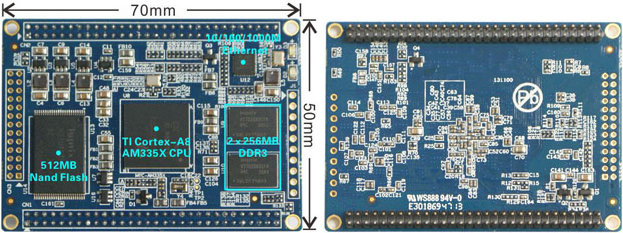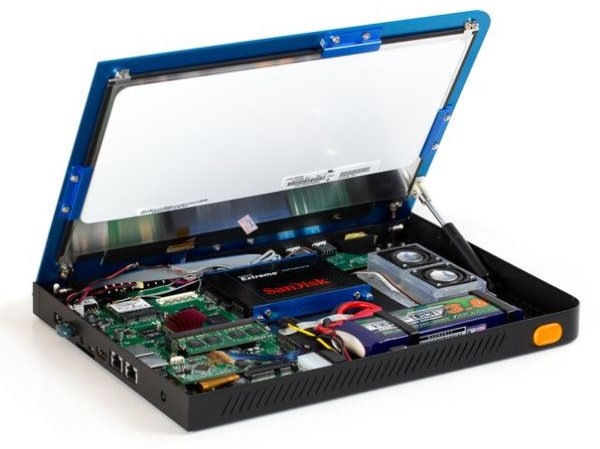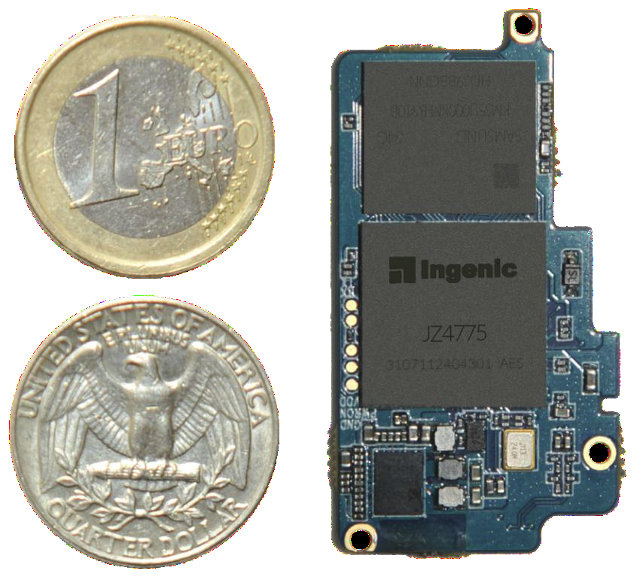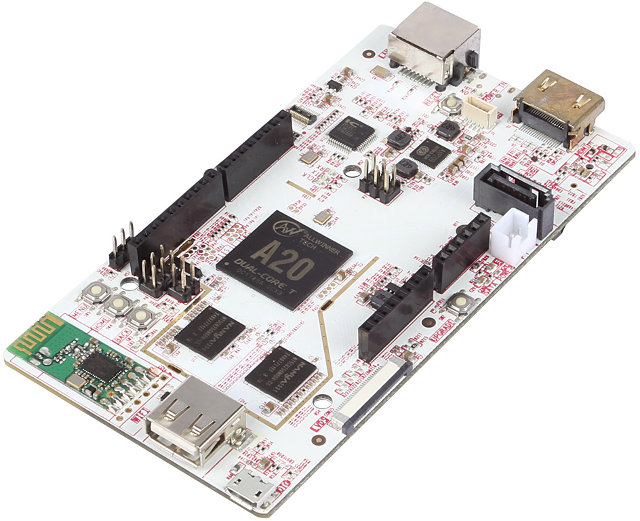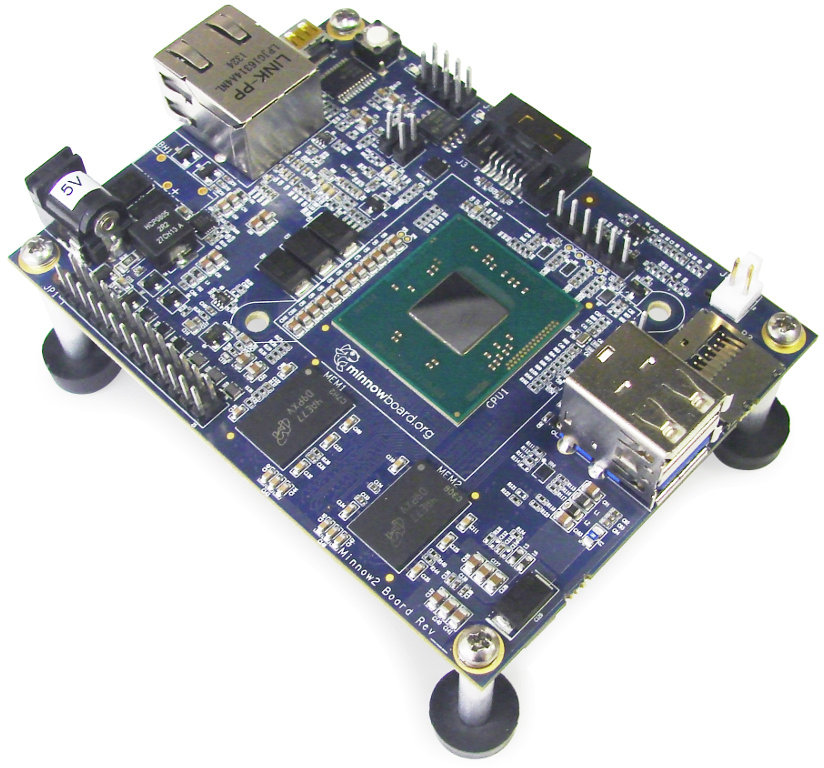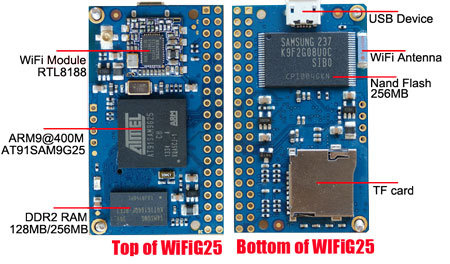MYIR has recently introduced MYD-AM335X development boards and MYC-AM335X CPU modules powered by Texas Instruments Sitara AM335x ARM Cortex A8 SoCs, (AM3352, AM3354, AM3356, AM3357, AM3358, and AM3359) that come with 512 MB RAM, 512 MB Flash, and a Gigabit Ethernet PHY. The boards and modules target home automation, industrial automation, enterprise/educational tablets, portable navigation devices and networking applications. MYC-AM335X CPU Modules MYC-AM335X CoM specifications: SoC – Texas Instruments AM3352, AM3354, AM3356, AM3357, AM3358, AM3359 ARM Cortex-A8 up to 1GHz with SGX530 GPU (AM3354/AM3358/AM3359 only) System Memory – 512MB DDR3 SDRAM Storage – 512MB NAND Flash Connectivity – On-board Gigabit Ethernet PHY Headers: 2x 2.0mm pitch 60-pin expansion connectors to connect the SoM to a baseboard with the following signals: 2x USB2.0 OTG ports, 6x Serial ports, 2x I2C, 1x SPI, 7x ADC, 2x PWM, 3x SDIO 1x 2.0mm pitch 26-pin expansion interface 1x 2.54mm pitch 10-pin expansion interface Misc – […]
Novena Open Source Hardware ARM Laptop Gets Crowdfunded for $1995
In 2012, Andrew Huang (“Bunnie”) decided to build an open source hardware and software laptop codenamed Novena powered by Freescale i.MX6 as a side project. The goal of the project was to be fully open source, both in terms of hardware and software, and the components have been selected so that the datasheets can be downloaded without NDA. Design has now been completed, and a crowdfunding campaign has now been launched on Crowd Supply, but since finding low cost part was not priority, you’ll have to fork $1,995 to get the complete laptop, $1,195 will get you the desktop version, and $500 the motherboard only. There’s also a version of the laptop called “Heirloom Laptop” with a hand-crafted wood and aluminum case that goes for $5,000. Let’s go through the board specs first: SoC – Freescale iMX6 Quad-core Cortex A9 CPU with NEON FPU @ 1.2 GHz. – NDA-free datasheet […]
Ingenic Newton Platform for Wearables is Powered by MIPS Based JZ4775 SoC
Imagination Technologies has published a blog post about Newton, a tiny reference design for wearables based on Ingenic JZ4775 MIPS SoC found in some recent smartwatches such as SmartQ Z1 (The CPU not the module). This module targets wearables, IoT, healthcare, home appliances, security, industrial control, consumer electronics and more. Newton Specifications: SoC – Ingenic JZ4775 MIPS Xburst processor @ 1 GHz with 2D GPU, and VPU supporting 720p@30fps for MPEG-2, MPEG-4, VC-1, H.264, VP8, and RV9 codecs. System Memory – Up to 3GB mobile DDR3/DDR2/LPDDR1 Storage – Up to 32 GB eMCP eMMC flash Display Support – LCD or EPD, with touch panel and backlight Audio – Digital MIC and Speaker Connectivity – 4-in-1 combo with Wi-Fi (802.11 a/b/g/n at 2.4/5 GHz), Bluetooth 4.0 + EDR (including Bluetooth LE support), NFC, and FM Sensors – 3-axis gyroscope, accelerometer magnetometer, pressure, humidity and temperature, bio-signal detection and processing USB – USB […]
pcDuino3 Development Board Features AllWinner A20 SoC, Arduino Headers
The first pcDuino board powered by AllWinner A10 has been available for about a year, later last year pcDuino V2 was released with a built-in Wi-Fi modules and mechanically and software compatible Arduino headers, and now pcDuino3 has been announced in a form factor similar to pcDuino V2 board but replacing AllWinner A10 Cortex A8 SoC with AllWinner A20 dual core Cortex A7, and improving overall specs such as faster Ethernet, the addition of a SATA port, and LiPo support. pcDuino3 specifications: SoC – AllWinner A20 dual core ARM Cortex A7 @ 1.0 GHz, with Mali 400MP2 GPU System Memory – 1GB DRAM Storage – 4GB NAND Flash, SATA connector, and microSD card slot (up to 32GB) Video Output – HDMI 1.4 with HDCP support, LVDS header Audio Out – 3.5mm analog audio interface, I2S stereo digital audio interface Connectivity – WiFi, 10/100M Ethernet USB – 1x USB host, 1x […]
$99 MinnowBoard MAX Development Board Powered by Intel Bay Trail-I SoC
When Intel released the original MinnowBoard which was a step in the right direction, but there were some complains, as the company had chosen to use an older Intel processor, and the price was much higher than most high performance low cost ARM development boards. MinnowBoard MAX (aka Minnow2 Board) fixes all that, as it features the latest Intel Bay Trail-I (E3800 series) processor, and costs as low as $99 for the single core version, and $129 for the dual core version. Let’s jump directly to the specifications: SoC – 64-bit Intel Atom E3815 (single-core, 1.46 GHz) or Atom E3825 (dual-core, 1.33 GHz) both with integrated Intel HD Graphics coming with Open Source hardware-accelerated drivers for Linux OS System Memory – 1GB ($99 model) or 2GB ($129 model) DDR3 RAM Storage – 1x Micro SD card slot, 1x SATA2 3Gb/sec, 8 MB SPI Flash for firmware (UEFI) Video Output – micro […]
Linux Kernel 3.14 Release
Linus Torvalds announced the release of Linux Kernel 3.14 yesterday: So we had a few fairly late changes that I could have done without, but the changelog from -rc8 is still pretty small, and I’m feeling pretty good about it all. If we did end up with any last-minute problems due to the final spurt of patches, they’ll be pretty specific, and it really didn’t make sense to me to delay the release without anything known pending. Much of the final spurt were either marked for stable or known regressions. So 3.14 is out there, and the merge window for 3.15 is thus open. Please do spend the time to test out 3.14, though, even if you might otherwise be in a hurry to send me your pending queue for the next release. Linus Kernel 3.13 brought a scalable block layer for high-performance SSDs, nftables, NFC payment support, squashfs performance […]
$30 CoreWind Tech WiFiG25 SoM Features Atmel SAM9G25 ARM9 Processor and a Wi-Fi Module
After their Aria G25 clone, called CORE9G25, CoreWind Tech has now launched a new SoM, WiFiG25, also powered by Atmel SAM9G25 ARM9 processor, but this time with a WiFi Module based on Realtek RTL8188, and up to 256 MB RAM, 256 MB Flash. Here are the specs of this system-on-module: CPU – Atmel AT91SAM9G25 ARM9 @ 400Mhz System Memory – 128 or 256 MB DDR2 Storage – 256MB NAND Flash, micro SD card slot Connectivity – WiFi Module with internal antenna 2x20Pin 2.54mm expand interface (through holes) with access to 2x USB host ports, 3x UART, 1x I2C, 1x SPI, 6x PWM, 27x GPIOs, and 4x 10-bit ADC Line level – TTL 3.3V Misc – User LED Power supply – 5V Dimensions – Size: 50.80 x 30 mm Weight – 5g Temperature range – Commercial: 0 to 70 °C, or industrial: -20 to 85 °C The company provide Linux 3.6.9 for the […]
Linaro 14.03 Release with Linux Kernel 3.14 and Android 4.4.2
Linaro 14.03 has just been released with Linux Kernel 3.14-rc7 (baseline), Linux Kernel 3.10.33 (LSK), and Android 4.4.2. This month, I could not find any major changes or updates, but work has been performed on big.LITTLE, Samsung Arndale / Arndale-octa, HiSilicon K3V2 and D01 boards and Broadcom Capri hardware, as well as ARMv8 models. Here are the highlights of this release: Linaro Stable Kernel (LSK) 3.10.33-2014.03 big.LITTLE support – ARM MP patch set, IKS (ARMv7 only). Interactive scheduler enhancements ARMv8 features – CPU frequency scaling, CPU topology, CPU suspend Power efficient workqueue support Android v3.10 patch set from AOSP GATOR ARMv8 4xA57 4xA53 FVP (Fixed Virtual Platform) and Versatile Express TC2 support Linux Linaro 3.14-rc7-2014.03 GATOR version 5.17 Android topic (linaro-android-3.14-merge) updated to get the recent code from AOSP uprobes v7 (new version) Updated big-LITTLE-pmu topic from ARM LT (Landing team) Updated basic Capri board support from Broadcom LT (bcm590xx […]


